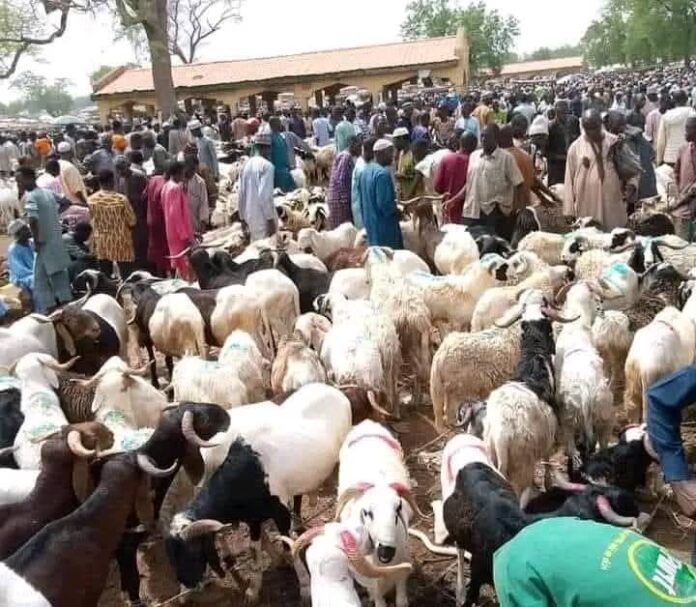2025 Eid-el-Kabir: Muslims settle for chickens, goats as ram sells for ₦500,000, ₦1million
By Maryam SULEIMAN, Cara LUCKSON, Zara AHMED, Maryam UMAR, Salim SANI (Abuja), Jameel YAKASAI (Kano)
As earnest preparations continue for the 2025 Eid-el-Kabir celebrations, Muslims in Nigeria are lamenting the surge in the prices of essential commodities needed for this vital religious festival
A market survey conducted by this newspaper shows that the exorbitant prices of livestock, especially rams, have led many families to seek other alternatives.
In Karu general abattoir, Abuja, FCT, traders noted that a single ram is being sold between ₦500,000, ₦700,000, and even ₦1 million, depending on the size and breed.
However, cheap, small rams go for ₦250,000, ₦350,000 to ₦400,000 respectively.
Nigerians turn to chickens, cows, and goats
Although many people still prefer rams for Sallah due to its religious significance.
Households have been forced to weigh their options.
Despite the ram being a symbolic animal during Eid celebrations, people are adjusting to the economic realities of the country.
Malam Aminu, a teacher, recalled buying two big rams for ₦250,000 each in 2024; he said he had to settle for one this year at the price of ₦500,000 as that is what he can afford after walking around the abattoir looking for fair prices.
He said, “This year, I bought a single ram for ₦500,000 instead of the two I usually buy in previous years. I have a big family, so I will still buy some kilos of beef to augment the meat.
Another buyer, Malam Bino Jibril, said he has opted to get two goats and manage with them as the prices of rams are out of his financial reach.
Low patronage
A trader at the Karu Abattoir, Usman Saidu, said buyers have been trooping in for days but end up not buying anything.
He said the cheapest cow can be bought for around ₦800,000. Though, each price depends on the size and weight of the animal.


He complained of low patronage since most people are settling for cows, chickens, and goats instead of rams.
“The rams are here, but it’s the buyers we don’t see. People come to ask about the prices and just go over to the cow sellers. I can’t blame them, things are very hard, buying a cow is more economical and offers better value for money.
“I observe that families or friends come together and contribute money to buy a cow which they share to fulfil the Eid sacrifice.
Other essential food items are not spared
A survey at the Karonmagiji Market along Airport Road, Abuja, shows that the prices of other essential food items have also gone up.
READ ALSO: Food prices drop in Nangere’s grain market
A basket of tomatoes goes for ₦75,000, a small basket stands at ₦20,000, a sack of onions is being sold for ₦90,000, Vital foreign rice (50kg) is ₦85,000, and Big Bull Rice (50kg) is ₦75,000.
Other items like a pack of Golden Penny Spaghetti can be obtained at ₦20,000, and Mai Kwabo Spaghetti sells for ₦15,000.
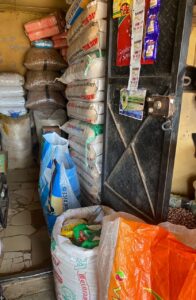
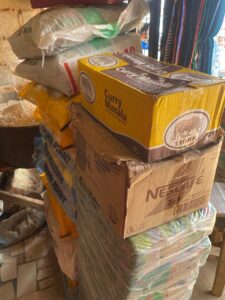
Traders at the market decry the high prices, especially the high costs of transporting goods. They called on the government to come up with favourable policies to reduce hardship and eliminate insecurity so the masses can afford daily foodstuffs.
Consumers adjust to economic realities
The same scenario was obtained in Wuse, Utako, and Jabi markets of the Federal Capital Territory.
Ram (average size) ₦150,000 to ₦450,000
Ram (bigger size) ₦500,000 to ₦1,000,000
Cow (Average) ₦800,000 to ₦1,200,000
Cow (Bigger) ₦1,000,000 to ₦1,500,000
Major food items like tomatoes (basket) go for ₦6,000 – ₦8,000, onions (basket) are sold for ₦6,000 – ₦8,000 and pepper (basket) can be obtained at ₦8,000 – ₦14,000.

In an interview, Miss Salama, a Pastry Chef, said, “Actually, the price hike is justified because the sellers buy the items at a high cost too.
“The price hike affected my Eid attire because things were too expensive, so I settled for cheaper alternatives. The most expensive things now are beans, semovita, and eggs.
Also speaking, Mr Yasir, a tea vendor, said, “I’m trying to save up, but it’s hard. Maybe we’ll just have a small celebration with family and friends.

Speaking on the predicament, Mr. Saleh, a butcher, said, “The increase is a big problem. I’ve been in the market for years but I hardly make sales nowadays. What I can confirm has increased drastically are chickens, rams, and cows.
“The fault is usually on the government, but the masses are also to be blamed, we tend to make our own increase in the original price, and this is due to a lack of sustainable customers, that is why the government must impose on people to only do their commercial activities inside organised markets.
Also speaking, Malam Bilal, a ram supplier, said, “This is the worst of all hikes, especially for food items and household supplies. I blame the petrol price hike for these problems.
“The leaders should find ways to solve the issues we are facing. The customers just have to cope in these trying times, as we are all doing.”
A visit to the Waru ram market in Abuja reveals a stark reality: ram prices have doubled compared to last year. Neptune Prime spoke with Malam Idi, a seller, who shared insights on the current market trends.
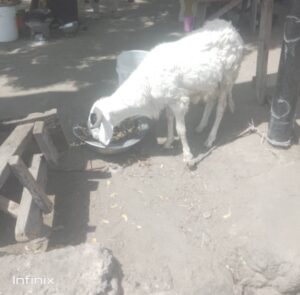

“Prices have increased,” Malam Idi said. “Average-sized rams that cost ₦120,000 last year now start at ₦200,000. Larger rams are sold between ₦350,000 and ₦480,000.”
According to Malam Idi, prices vary based on size and breed, but here’s what buyers can expect to pay:
– Average-sized rams: ₦200,000 to ₦250,000
– Larger rams: ₦350,000 to ₦480,000
– Smaller rams: ₦110,000 (up from ₦60,000 last year).
A buyer who purchased a ram for ₦170,000 expressed his concerns about the high prices.
“I bought almost the same size last year for ₦110,000, but now it’s almost ₦60,000 higher. The prices are really high.”
More burden on low-income households
When a Neptune Prime reporter visited Kano state, Muslims lamented the exorbitant prices of essential items needed for the Sallah festivities.
The situation has placed more burden on households, especially low-income families.
During a visit to the popular Garu vegetables and food market in Madobi Local Government area, our correspondent observed that the price of a basket of pepper, which was sold around ₦28,000 in the afternoon, skyrocketed to ₦34,000 in the evening of the same day.
Also, a basket of tomatoes, which was sold at ₦11,000 some weeks back, goes for ₦15,000 because of the Sallah celebration.
A basket of pepper is sold between ₦38,000 and ₦40,000 at the market, located about 15 kilometres from Kano city.
A trader at the market, Malam Sammani Zakari Ya’u, attributed the rise in prices to demand and scarcity of some of the commodities in the state.
According to Mr Zakari, the situation is gradually becoming a norm that when demands are high, prices will “naturally” go up as the commodities become scarce until it reaches a point of supplying it from other states.
A customer, Khadija Aminu, decried the skyrocketing prices of the commodities within a short period.
According to Mrs Aminu, “Just less than two months ago, a basket of tomatoes was ₦3,500 to ₦4,000, but now it is ₦12,000.
“A basket of pepper was ₦7,500 then, now it is ₦30,000 to ₦34,000. The situation is worrisome. Ironically, every Sallah season, prices of essential commodities rise, I don’t know why. Something must be done to address the situation,” she said.
Traders and buyers urge the government to act fast
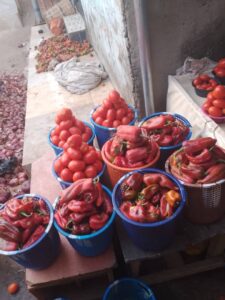
A visit to the fish market in Apo reveals that some Nigerians are settling for chickens for the Eid celebration.
A trader, Dauda Kabiru, said he has been selling chickens for ₦8,000, ₦9,000 and ₦25,000 since the Sallah preparations started.
He said patronage has been good throughout the week because many people can not afford rams, so they turn to chickens.
He added that some customers come to buy three to five chickens at once, depending on the size of their families.
On his part, a trader, Umar Muhammad, who sells essential ingredients, a father of 21 children, lamented low patronage and the decline of small businesses in Nigeria.

He attributed the high prices to the economic challenges in the country, which have affected many businesses like his and made their plans for Sallah a nightmare.
Muhammad called on the government to come up with policies that will help farmers have bountiful harvests, so there will be abundance, and prices can go down.
He said, “A bag of onions that used to be ₦55,000 some days back has increased to ₦80,000, making the price of a basket stand at ₦5,000 instead of ₦3,000.
Follow the Neptune Prime channel on WhatsApp:
Do you have breaking news, interview request, opinion, suggestion, or want your event covered? Email us at neptuneprime2233@gmail.com

